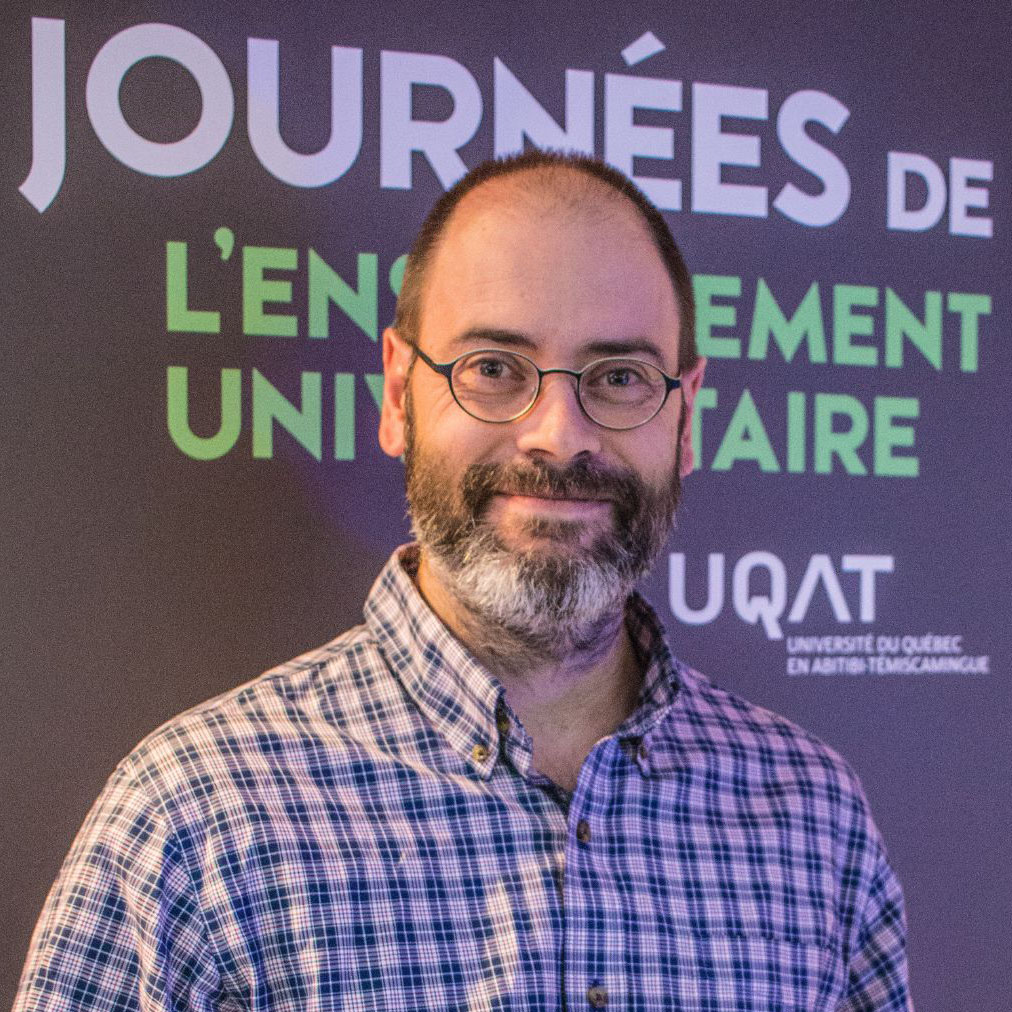Hugo Asselin (he/him)
Full Professor
Université du Québec en Abitibi-Témiscamingue
Learn About My Career
I do research and teach university courses.
I was born/grew up in: Rouyn-Noranda, Québec, Canada
I now live in: Rouyn-Noranda, Québec, Canada
I completed my training/education at: All my studies in Quebec (Canada). Primary and secondary school in Rouyn-Noranda. College diploma (half natural sciences, half social sciences) from Cégep de l'Abitibi-Témiscamingue. Bachelor's degree in biology (ecology) from Université de Sherbrooke. Master's degree in biology (forest ecology), Université de Montréal. Doctorate in biology (paleoecology), Université Laval. Postdoctorate in Native Studies (UQAT).
As a teacher, I work a lot with students. At undergraduate level, I teach courses on a variety of subjects. At the graduate level, I teach some courses and supervise students in their research work. Doing research with students is the part of my job that I enjoy the most!
I do a lot of writing at work. I write scientific articles and chapters for books. I also write grant applications to get money to do research. You can’t do research without money! I attend many meetings. It’s not my favorite thing, but it is important. I also supervise employees, make decisions and sign forms to keep my teams running.
My work involves both the natural sciences and the humanities and social sciences. I'm interested in the land; how it's used, how it's shared, and so on. My work is mainly in French. However, since the main language of scientific publication is English, I also have to work a lot in English. My work with Indigenous people has led me to be interested in their languages. Some of my international collaborations have led me to learn Spanish.
When I was in high school, I wanted to be a veterinarian. But by the time I got to CEGEP, I was trying to decide what I wanted to do. I started in the natural sciences. Then I switched to the humanities. Later, I did a bit of both. I finally decided to go into biology at university. I figured I could still learn about animals as well as other things. Even at this stage, I was not sure what I wanted to do. I even considered journalism!
During my undergraduate studies, a professor asked me if I'd be interested in doing a master’s in forest ecology. The subject was interesting, and she offered me a scholarship. That was important (you have to pay the rent!). Also, the project was in my home region. So, I started my master’s program. Then I met an inspiring professor who had come to give a lecture at my university. I said to myself, "If I'm going to do a PhD, it's got to be with him!” I asked him if he had a project I could work on, and he said yes.
I did a PhD in paleoecology. This is the study of ecology of the past using plant and animal fossils. After I completed this degree, I wanted to get back into the humanities and social sciences. I was lucky and honored to be accepted by Indigenous communities during my post-doctoral internship. They trusted me and shared their knowledge with me. My somewhat special path gradually led me to my current position as a university professor. Here I can devote myself to all my interests at the same time. But I didn’t plan this career path in advance. I went where there are good opportunities to learn and trusted that there would be a place for me somewhere.
What I love the most is doing research projects with master's and PhD students. It gives me the chance to meet lots of motivated and inspiring people. I also get to learn about lots of fascinating subjects. Even if some aspects of my work are repetitive, it's never the same. I update the content of my courses in line with current events and scientific developments. I'm always working on new research projects with new partners. Being a university professor is hard work! You must study for a long time. You have a lot of responsibilities and long working weeks. It's worth it because it's very rewarding and stimulating.
I am accompanying students on their educational journey. As I pass on my knowledge and experience, I hope to help them find what they love and develop their potential. My research projects are always done WITH (and not ON) communities and organizations. We work together to find solutions to their challenges. Sometimes, my courses or projects might influence certain decisions (e.g. policies) that affect our lives (hopefully for the better!).
I try to make time for sports (soccer). I play a little music (guitar and violin). I read books. I prefer real paper books, because I spend all day in front of my screen for work!
A PhD takes a lot of study. But the further you go, the more stimulating and interesting it becomes. You have to be patient. And you have to be on the lookout for the right opportunities and projects that come your way. Above all, you have to be curious.
What I do at work
As a teacher, I work a lot with students. At undergraduate level, I teach courses on a variety of subjects. At the graduate level, I teach some courses and supervise students in their research work. Doing research with students is the part of my job that I enjoy the most!
I do a lot of writing at work. I write scientific articles and chapters for books. I also write grant applications to get money to do research. You can’t do research without money! I attend many meetings. It’s not my favorite thing, but it is important. I also supervise employees, make decisions and sign forms to keep my teams running.
My work involves both the natural sciences and the humanities and social sciences. I'm interested in the land; how it's used, how it's shared, and so on. My work is mainly in French. However, since the main language of scientific publication is English, I also have to work a lot in English. My work with Indigenous people has led me to be interested in their languages. Some of my international collaborations have led me to learn Spanish.
My career path is
When I was in high school, I wanted to be a veterinarian. But by the time I got to CEGEP, I was trying to decide what I wanted to do. I started in the natural sciences. Then I switched to the humanities. Later, I did a bit of both. I finally decided to go into biology at university. I figured I could still learn about animals as well as other things. Even at this stage, I was not sure what I wanted to do. I even considered journalism!
During my undergraduate studies, a professor asked me if I'd be interested in doing a master’s in forest ecology. The subject was interesting, and she offered me a scholarship. That was important (you have to pay the rent!). Also, the project was in my home region. So, I started my master’s program. Then I met an inspiring professor who had come to give a lecture at my university. I said to myself, "If I'm going to do a PhD, it's got to be with him!” I asked him if he had a project I could work on, and he said yes.
I did a PhD in paleoecology. This is the study of ecology of the past using plant and animal fossils. After I completed this degree, I wanted to get back into the humanities and social sciences. I was lucky and honored to be accepted by Indigenous communities during my post-doctoral internship. They trusted me and shared their knowledge with me. My somewhat special path gradually led me to my current position as a university professor. Here I can devote myself to all my interests at the same time. But I didn’t plan this career path in advance. I went where there are good opportunities to learn and trusted that there would be a place for me somewhere.
I am motivated by
What I love the most is doing research projects with master's and PhD students. It gives me the chance to meet lots of motivated and inspiring people. I also get to learn about lots of fascinating subjects. Even if some aspects of my work are repetitive, it's never the same. I update the content of my courses in line with current events and scientific developments. I'm always working on new research projects with new partners. Being a university professor is hard work! You must study for a long time. You have a lot of responsibilities and long working weeks. It's worth it because it's very rewarding and stimulating.
How I affect peoples’ lives
I am accompanying students on their educational journey. As I pass on my knowledge and experience, I hope to help them find what they love and develop their potential. My research projects are always done WITH (and not ON) communities and organizations. We work together to find solutions to their challenges. Sometimes, my courses or projects might influence certain decisions (e.g. policies) that affect our lives (hopefully for the better!).
Outside of work I
I try to make time for sports (soccer). I play a little music (guitar and violin). I read books. I prefer real paper books, because I spend all day in front of my screen for work!
My advice to others
A PhD takes a lot of study. But the further you go, the more stimulating and interesting it becomes. You have to be patient. And you have to be on the lookout for the right opportunities and projects that come your way. Above all, you have to be curious.
When I was a student I enjoyed:
- Drama
- Geography
- Literature and Language Arts
- Music
- Science
When I was a student, I would describe myself as someone who:
- Brought people together
- Enjoyed doing things on my own
- Always wanted to be outside
- Liked helping people
- Played on a sports team
- Wanted to be in charge
- Liked being given specific instructions
- Liked being given
- Liked reading
- Wasn't sure what I wanted to do
- Learned best by doing
Related Topics
Explore More Career Profiles
-
Sarra Filali
Career Profiles
Doctoral Student, Science, Technology and Society
I'm a PhD student, specializing in the relationship between science, technology and society. -
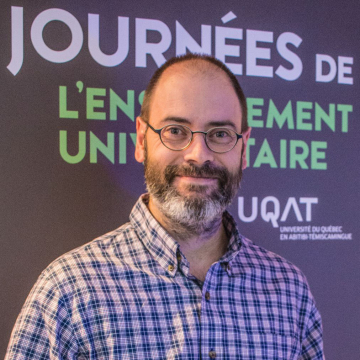
Hugo Asselin (he/him)
Career Profiles
Full Professor
I do research and teach university courses. -
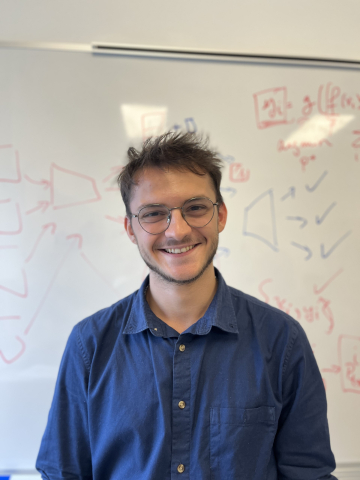
Charles Bricout (he/him)
Career Profiles
Master's Student, Applied Science
I'm a graduate student, and my program includes a major research project supervised by a professor. -
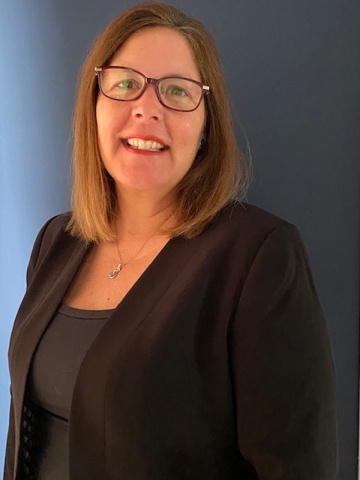
Sonia Francoeur
Career Profiles
Business Manager
I manage sales of laboratory products for part of Quebec and the Ottawa region. -
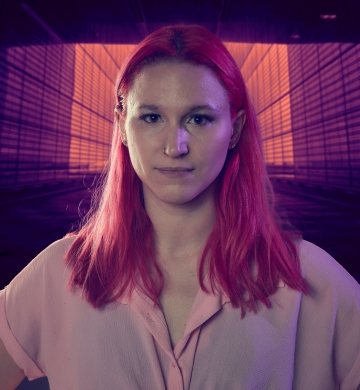
Marion Cossin (she/her)
Career Profiles
Research Engineer
I do research on how acrobats use their equipment and explore the design of new circus equipment and improve the performances. -
Brianna Lummerding
Career Profiles
Agronomic Innovation Manager
I look after all things related to soil management for a group of retailers. -
Li Tan (he/him)
Career Profiles
Molecular Lead
I coordinate the day-to-day operations in the DNA Extraction Lab. -
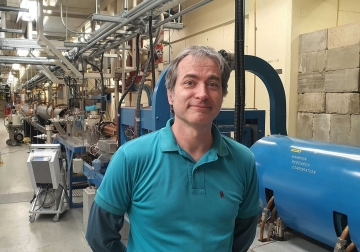
Frédéric Le Pimpec
Career Profiles
Accelerator Operations and Development Manager
I am responsible for the proper functioning, maintenance and updates of the synchrotron accelerator chain at the Canadian Light Source.
-
Tyler Morhart (video)
Career Profiles
Scientist, Beamline Responsible - SyLMAND
I am responsible for the SyLMAND beamline at the Canadian Light Source synchrotron facility. -
Li Tan (Video)
Career Profiles
Molecular Lead
I coordinate the day-to-day operations in the DNA Extraction Lab. -

Rashell Featherstone (she/her)
Career Profiles
Senior Program Associate
I coordinate projects for the development of new products at STEMCELL. -

Kira Hoffman (she/her)
Career Profiles
Postdoctoral Researcher/Fire Ecologist
I am a researcher at both a university and a not-for profit organization where I am gaining experience to become a senior researcher.
